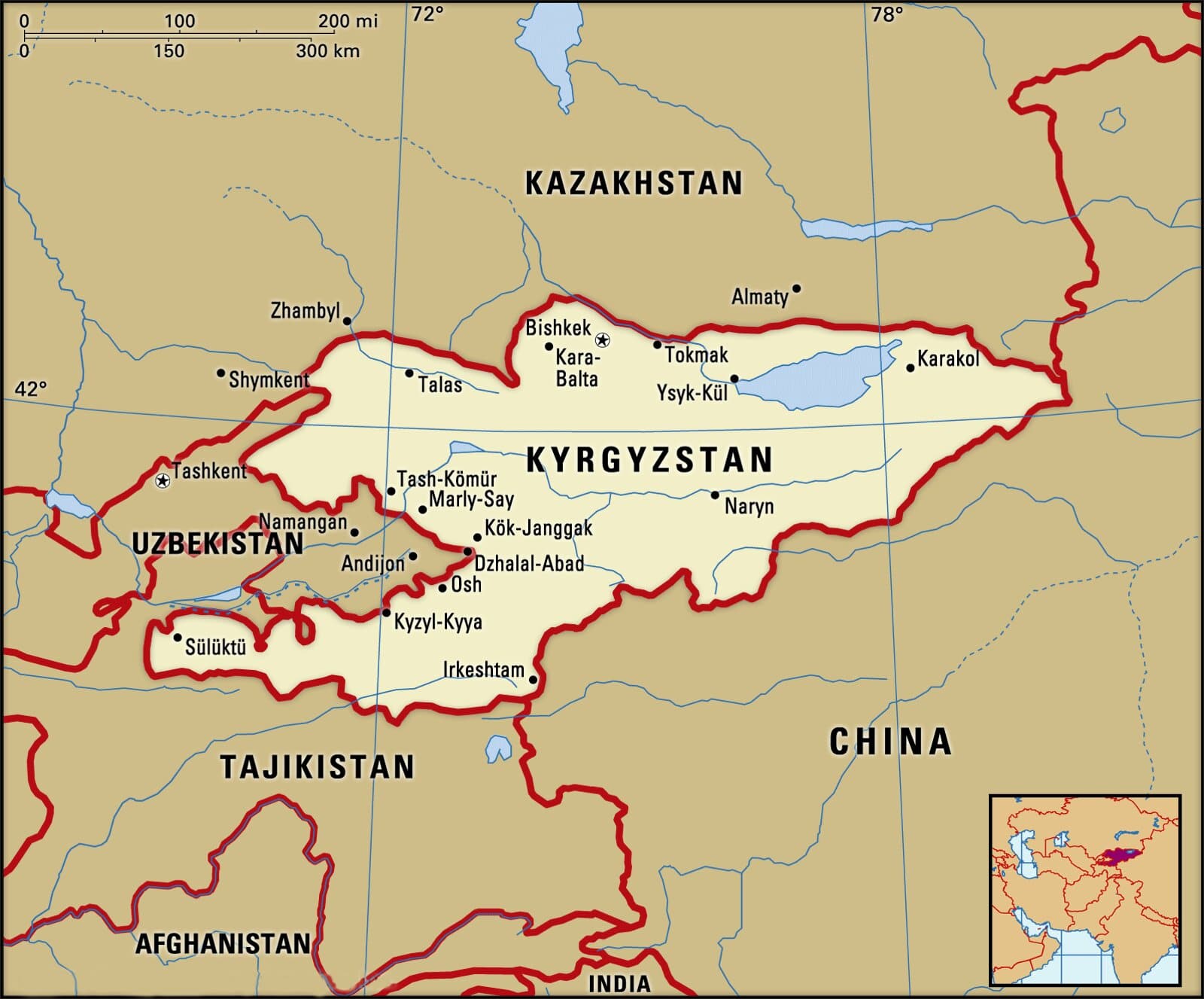Protests to Coup: Kyrgyzstan
Why in News
Protesters in Kyrgyzstan have captured key government buildings, including the Parliament house and the presidential office and the situation is like a coup.
Key Points
- Background: Kyrgyzstan, often referred to as Central Asia’s only democracy, had seen violent anti-government protests in the past.
- In 2005 and 2010, sitting presidents were forced out of office in popular protests- ‘Tulip’ and ‘Melon’ revolutions.
- The current protests began after early results of the parliamentary election were announced.
- Political parties in Kyrgyzstan should win at least 7% of the popular vote to enter Parliament.
- The results showed that only four parties managed to cross the threshold and of which, three were pro-government parties.
- The only one opposition party could cross the threshold.
- Reason for the protest:
- Even before the election, political fault lines were sharpening in Kyrgyzstan.
- The country’s main political party, the Social Democratic Party of Kyrgyzstan (SDPK), stayed out of the election due to intra-party rift and split.
- Several political leaders were detained and elections were perceived as rigged.
- Consequently, after elections, protestors formed a Coordination Council to lead the “revolution”. The country’s Election Commission annulled the results, but the protesters continued.
- Official View: Opposition’s intention is to instigate a political coup.
- The Opposition’s View: The elections were rigged which made people protest against the establishment.
- Kyrgyzstan’s importance:

- It has been key to the strategic plans of both Russia and China.
- Russia considers the region as its backyard and plays hard politics to retain its influence.
- Kyrgyzstan is a member of the Russia-led Collective Security Treaty Organisation (CSTO).
- CSTO is a Russia-led military alliance of six former Soviet states that was created in 2002.
- Its aim is to ensure the collective defence of any member that faces external aggression.
- Members of CSTO: Armenia, Belarus, Kazakhstan, Kyrgyzstan, Russian Federation and Tajikistan
- While Russia has cultivated strong ties with all political factions in Kyrgyzstan, radical political changes could throw up opportunities for its rivals.
- Belarus, another country in Russia’s backyard with a pro-Russia President, is already witnessing political turmoil after August’s Presidential election.
- In the South Caucasus, the conflict between Armenia and Azerbaijan, both former Soviet Republics, over Nagorno-Karabakh, risks dragging Russia into a conflict that Russia doesn’t want.
- All three combined, Russia’s attempts to build stronger political and economic integration with the former Soviet region are suddenly facing critical challenges.
- Kyrgyzstan is a member of the Russia-led Collective Security Treaty Organisation (CSTO).
- China- This landlocked Central Asian country that shares a long border with China.
- It is located at the centre of Eurasia, is a vital link in its Belt and Road Initiative.
- In 2019, Chinese President visited Bishkek (capital)- shows close link with the current establishment.
- China has built road and rail networks with Kyrgyzstan and Uzbekistan.
- USA: During the early stages of the Afghan war, the USA had used Kyrgyzstan for refuelling and other logistical purposes.
- The USA base was shut down in 2014 by Parliament.
- A regime change can be favourable for the USA.
India-Kyrgyzstan
- India has enjoyed strong bilateral ties with Kyrgyzstan since 1991.
- India was one of the first countries to establish diplomatic ties with Kyrgyzstan in 1992.
- Since 1992, the two countries have many agreements, including on Culture, Trade and Economic Cooperation, Civil Aviation, Investment Promotion and Protection, Avoidance of Double Taxation, Consular Convention etc.
- In 2011, the joint ‘Khanjar’ series of exercises was started.
- Indian diaspora in Kyrgyzstan- about 9,000 Indian students are studying medicine in various medical institutions in the country. Also, there are many businessmen living in Kyrgyzstan who are involved in trade and several other services there.
- Strategic: The Kyrgyz leaderships have been largely supportive of India’s stand on Kashmir.
- They also support India’s bid for a permanent seat at the UNSC.
- Departure from a Democratic Regime may bring uncertainty for India’s interests.
Way Forward
- Due to the strategic importance of the country, other nations with interest in the new regime may interfere. This must not form another zone of cold war. The process must be Kyrgyz-led and Kyrgyz-owned for long-term stability.
- India can have a word in order to support the democratic and peaceful political system in Kyrgyzstan.
- Also, India can explore the communication with the potential political factions in Kyrgyzstan that can form the government in Kyrgyzstan.